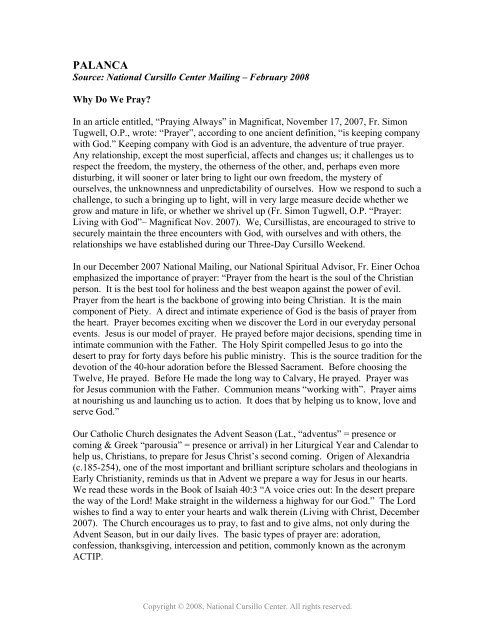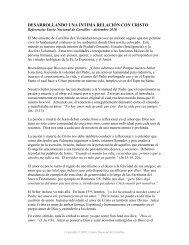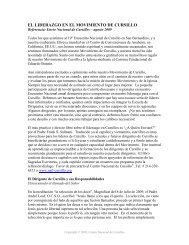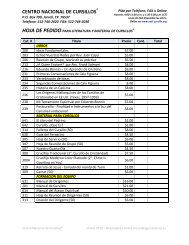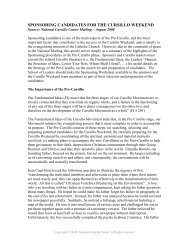PALANCA Source - National Cursillo® Center
PALANCA Source - National Cursillo® Center
PALANCA Source - National Cursillo® Center
Create successful ePaper yourself
Turn your PDF publications into a flip-book with our unique Google optimized e-Paper software.
<strong>PALANCA</strong><br />
<strong>Source</strong>: <strong>National</strong> Cursillo <strong>Center</strong> Mailing – February 2008<br />
Why Do We Pray?<br />
In an article entitled, “Praying Always” in Magnificat, November 17, 2007, Fr. Simon<br />
Tugwell, O.P., wrote: “Prayer”, according to one ancient definition, “is keeping company<br />
with God.” Keeping company with God is an adventure, the adventure of true prayer.<br />
Any relationship, except the most superficial, affects and changes us; it challenges us to<br />
respect the freedom, the mystery, the otherness of the other, and, perhaps even more<br />
disturbing, it will sooner or later bring to light our own freedom, the mystery of<br />
ourselves, the unknownness and unpredictability of ourselves. How we respond to such a<br />
challenge, to such a bringing up to light, will in very large measure decide whether we<br />
grow and mature in life, or whether we shrivel up (Fr. Simon Tugwell, O.P. “Prayer:<br />
Living with God”– Magnificat Nov. 2007). We, Cursillistas, are encouraged to strive to<br />
securely maintain the three encounters with God, with ourselves and with others, the<br />
relationships we have established during our Three-Day Cursillo Weekend.<br />
In our December 2007 <strong>National</strong> Mailing, our <strong>National</strong> Spiritual Advisor, Fr. Einer Ochoa<br />
emphasized the importance of prayer: “Prayer from the heart is the soul of the Christian<br />
person. It is the best tool for holiness and the best weapon against the power of evil.<br />
Prayer from the heart is the backbone of growing into being Christian. It is the main<br />
component of Piety. A direct and intimate experience of God is the basis of prayer from<br />
the heart. Prayer becomes exciting when we discover the Lord in our everyday personal<br />
events. Jesus is our model of prayer. He prayed before major decisions, spending time in<br />
intimate communion with the Father. The Holy Spirit compelled Jesus to go into the<br />
desert to pray for forty days before his public ministry. This is the source tradition for the<br />
devotion of the 40-hour adoration before the Blessed Sacrament. Before choosing the<br />
Twelve, He prayed. Before He made the long way to Calvary, He prayed. Prayer was<br />
for Jesus communion with the Father. Communion means “working with”. Prayer aims<br />
at nourishing us and launching us to action. It does that by helping us to know, love and<br />
serve God.”<br />
Our Catholic Church designates the Advent Season (Lat., “adventus” = presence or<br />
coming & Greek “parousia” = presence or arrival) in her Liturgical Year and Calendar to<br />
help us, Christians, to prepare for Jesus Christ’s second coming. Origen of Alexandria<br />
(c.185-254), one of the most important and brilliant scripture scholars and theologians in<br />
Early Christianity, reminds us that in Advent we prepare a way for Jesus in our hearts.<br />
We read these words in the Book of Isaiah 40:3 “A voice cries out: In the desert prepare<br />
the way of the Lord! Make straight in the wilderness a highway for our God.” The Lord<br />
wishes to find a way to enter your hearts and walk therein (Living with Christ, December<br />
2007). The Church encourages us to pray, to fast and to give alms, not only during the<br />
Advent Season, but in our daily lives. The basic types of prayer are: adoration,<br />
confession, thanksgiving, intercession and petition, commonly known as the acronym<br />
ACTIP.<br />
Copyright © 2008, <strong>National</strong> Cursillo <strong>Center</strong>. All rights reserved.
Prayer rises up quickly to the ears of God when lifted up by the recommendation of alms<br />
giving and fasting. In other words, prayer needs sacrifices, which are Palanca, useful<br />
tools to lift up our praying hearts to God. St. Leo the Great advised us, “Give what you<br />
receive, sow what you reap, scatter what you collect. Your property increases by being<br />
well spent. Long for the lawful reward of mercy, and pursue the business of the eternal<br />
profit. “Give and it will be given to you.” You must embrace the condition of this<br />
promise and show your gratitude.” (Magnificat, Nov. 20, 2007). It is more blessed to<br />
give than to receive. (Acts 20:35)<br />
Why Do We Have “Dry Time” in Prayer and How Should We Overcome It?<br />
In the article “Teach Us to Pray”, Joe Difato, Publisher of the Word Among Us, October<br />
2007, wrote: We believe that Jesus is real. We believe he is present in the Eucharist. We<br />
believe that everyone who is baptized is a “temple of God”, and the Spirit of God lives in<br />
us (1 Cor. 3:16). We believe that prayer is vital to our Christian lives. So why do we find<br />
it so difficult to pray? Then Mr. Difato suggested the following reasons:<br />
First, possibly we did not seriously take Jesus’ warning to the believers in Ephesus. They<br />
were active members in their church, and yet they had lost sight of what was meant to be<br />
at the heart of their faith: love for Jesus (Revelation 2:2-4). How easy it can be to slip<br />
into a functional and duty-driven approach to our faith! How easy it is to let the passion<br />
we once knew for Jesus fade away!<br />
Second, maybe our priorities are out of order. This old proverb remains true: Time is a<br />
statement of our priorities. The invited guests to a banquet in Jesus’ parable related by<br />
Luke (14:16-24) allowed their self-centered interests – even good and necessary – to<br />
obscure the greatness of the invitation they had received. Jesus wants to spend quality<br />
time with us every day. When we consider ourselves too busy for him, we are really<br />
saying that our relationship with him is not a top priority.<br />
Third, like the Israelites, we can tell Jesus, “I try to avoid sin, I try to do good. I’ve been<br />
faithful to you. But you still don’t answer me.” Jesus wants us to come to him with a<br />
pure and humble heart. He wants us to tell him, “Jesus, I want what you want; I will do<br />
what you say. I do not want my ways over your ways.” Besides, maybe God is asking us<br />
to trust him more deeply, and possibly he may test to see if we will give up on him.<br />
Sarah, Abraham’s wife, Zechariah and Thomas doubted the Lord. Jesus taught us: “All<br />
that you ask for in prayer, believe that you will receive it and it shall be yours.” (Mark<br />
11:24) Jesus wants us to know that he will answer our prayer because he wants to guide<br />
us in every way. The time it takes does not matter because we believe Jesus will answer<br />
us. His own life gives proof of this truth” (The Word Among Us, Oct. 2007, Vol. 26, #<br />
10).<br />
How do we get through a “dry time” in our prayer? In a special section of Our Sunday<br />
Visitor Newspaper, Dec. 9, 2007, entitled “In Focus: Prayer”, Father Ray Ryland<br />
remarked, “Sometimes what we call dryness is rooted in moral or spiritual conflict in our<br />
lives, and he advised that frequent confession (every two weeks or so) is necessary for<br />
Copyright © 2008, <strong>National</strong> Cursillo <strong>Center</strong>. All rights reserved.
proper preparation for prayer.” Father Ryland also encouraged us to examine the quality<br />
of our personal relationship with Our Lord when prayer is difficult or seems meaningless<br />
to us; and most importantly, we must persevere. He cited St. Anthony the Hermit as an<br />
example of perseverance, who “once came through a period of temptation and spiritual<br />
distress.”<br />
Palanca: An Expression of Brotherly Love in Our Cursillo Movement<br />
Every Cursillista, after returning from their Weekend, knows what Palanca means. It is a<br />
Spanish word, literally meaning “a lever”. It is a tool that we use to lift up or move<br />
something bulky. In the Eucharistic Prayer of the Holy Mass, the celebrant says to the<br />
congregation, “Lift up your hearts!” and everyone responds, “We lift them up to the<br />
Lord”. How do we lift up our hearts to the Lord, if not through prayer? Cursillo<br />
Literature states that the Cursillo Movement used the term “Palanca”, a lever, to convey<br />
the essential meaning of the Paschal Mystery of Christ in which we are all called to<br />
participate in our own lives. The lever is seen as what we might in our own culture refer<br />
to as a “seesaw”, where a group of individuals gather at one end to lift up another<br />
individual or group higher than themselves. The visual idea of individuals getting on one<br />
end of the seesaw so that their weight carries them down to the ground to lift others up is<br />
the way to express that Paschal Mystery all Christians are called to experience in their<br />
spiritual lives. It should be made apparent that it is normal for Christians to pray and<br />
sacrifice for others, known as an ecclesial community or brotherly love in prayer. Father<br />
Raniero Cantalamessa, O.F.M. Cap., the Preacher to the Papal Household, said of the<br />
importance of brotherly love, especially in our Communal Palanca. He wrote, “We<br />
cannot insist enough on the importance of an atmosphere of brotherly love surrounding<br />
those who are going to receive the baptism of the Holy Spirit. Prayer is also closely<br />
connected with the outpouring of the Spirit in the New Testament. Concerning Jesus’<br />
baptism, Luke writes, ‘While he was in prayer, the heavens opened and the Holy Spirit<br />
descended upon him.’ (Luke 3:21) It was Jesus’ prayer, we could say, that made the<br />
heavens open and Holy Spirit descend upon Him”. (Sober Intoxication of the Spirit Filled<br />
with the Fullness of God)<br />
The Cursillo Movement assures us that prayer has always been the strength of all the<br />
functions of the Movement. The “Fundamental Ideas of the Cursillo Movement” (FICM)<br />
strongly recognizes grace as principle and foundation of our Movement and considers<br />
Palanca as one of the basic elements of the Cursillo Strategy, known as the Mystery of<br />
the Palanca. “Whenever we speak of working for conversion, for the Christian<br />
betterment of individuals, or for the Christianization of environments, it is indispensable<br />
– as the first and the most basic step underlying all other human efforts – to count on the<br />
help of grace from God, which has to be begged for with the all-powerful strength of<br />
prayer that is humble, confident, and unceasing. Today, perhaps more than ever before, it<br />
is absolutely urgent to remember that without Him we are nothing, we are worth nothing,<br />
we can do nothing. We must, before anything else, reaffirm the primacy that the Cursillo<br />
strategy has always given, as its most important characteristic, to Palanca (prayer,<br />
sacrifice, and works of mercy). Dependence on this has to be real, sincere and<br />
permanent, individual and communal, to guarantee the efficacy of any other steps one<br />
Copyright © 2008, <strong>National</strong> Cursillo <strong>Center</strong>. All rights reserved.
takes. The truth is founded on the promise of Christ: ‘Ask and you shall receive, seek<br />
and you shall find, knock and it shall be opened to you.’ (Mt 7:7)” (FICM # 180)<br />
“Profound communion with God, acquired by way of prayer, sacrifice, reception of the<br />
sacraments, and reflection on the Word, will mark every moment of the Cursillo.” (FICM<br />
# 237) “Prayers and sacrifices on behalf of the Cursillo, which Cursillo terminology calls<br />
“intendencias” or “palanca”, are crucial to its spiritual success.” (FICM # 333) We can<br />
summarize the necessity of Palanca in our Movement with this popular saying in Cursillo<br />
circles, “Talk to God about the person before you talk to the person about God.”<br />
Authentic Palanca<br />
In our Cursillo Movement, prayer or “Palanca” should be a tool to assist its every phase:<br />
Precursillo, Cursillo, Postcursillo, Ultreya, Group Reunion, and Cursillistas in every<br />
Cursillo function. Palanca should be a tool to support the entire Movement, and hence<br />
our Catholic Church. Chapter 12 of the Leader’s Manual of our US Cursillo Movement<br />
asserts: “In dealing with the work of conversion and Christian renewal of persons and the<br />
evangelization of human groups, it is necessary, first and foremost, that all the other<br />
human efforts be built upon the grace of God, which should be sought with the<br />
omnipotent zeal of trusting, constant and humble prayer.” Therefore, prayer without<br />
sacrifice is not Palanca. Following are Cursillo Prayer Traditions recommended as<br />
Palanca to lift up our petitions to God for the success of our Cursillo activities: Holy<br />
Mass, Eucharistic Adoration, Holy Communion, praying the Rosary, reading the<br />
Scriptures, Stations of the Cross, Liturgy of the Hours, Chaplet of the Divine Mercy,<br />
visits to the Blessed Sacrament, fasting, almsgiving and any acts of self-denial offered<br />
with a prayer. Jesus taught about Almsgiving, Prayer and Fasting for his disciples in Mt.<br />
6:1-18. The Acts of the Apostles related that the early Christians gathered to pray, to<br />
listen to the Apostles’ teaching and to share with one another everything they had, and<br />
their money was distributed to each one according to his need. (Acts 4: 32-35)<br />
It is important to understand that Palanca offerings should not be limited to any particular<br />
Cursillo function, the Three-Day Weekend, in particular. The Leader’s Manual also<br />
affirms that sacrifice is part and parcel of the Christian life. If the Movement quit<br />
emphasizing the importance of sacrifice, it would not be Christ-centered. The best way<br />
to maintain our spirituality is to live the spirit of Palanca each day. A few examples of<br />
“simple ways” of Palanca or means of personal sacrifice are given in the Leader’s<br />
Manual: to love expecting nothing in return; to be patient where there is impatience in<br />
misunderstandings, … The Leader’s Manual of our Cursillo Movement gives this advice,<br />
“Within the Movement, we must be vigilant that the term Palanca not be misunderstood<br />
and abused, so that incidentals do not overshadow its inner calling and meaning.<br />
Colorful posters and banners (in themselves) are not Palanca; neither are flowers, edibles,<br />
friendship letters or good wishes. This is false Palanca under the guise of “pleasant<br />
things”.<br />
Prayer and sacrifice are not “pleasant things”, but they are effective in securing God’s<br />
grace. It must be understood that letters are not Palanca. Letters are merely the means of<br />
communicating the Palanca currently being done. Keeping this in mind, we must realize<br />
Copyright © 2008, <strong>National</strong> Cursillo <strong>Center</strong>. All rights reserved.
that Palanca can be done for a particular purpose, without having to write a letter about it.<br />
For instance, Palanca can be done by the efforts of Cursillistas who are trying to utilize<br />
the Cursillo Method. We all need a Palanca of this type, but it would be impractical to<br />
write letters to thousands of Cursillistas” (Leader’s Manual, Ch. 12). St. Paul, the Patron<br />
Saint of our Cursillo Movement, reminds us in Romans 12:1, “Offer yourselves as a<br />
living and holy sacrifice which is pleasing unto Him”. This should be our real offering.<br />
In his earlier-mentioned book, Fr. Raniero Cantalamessa quoted from Tertullian, saying<br />
“There is nothing which leaves the minds of men so amazed as the simplicity of the<br />
divine actions which they see performed and the magnificence of the effects that follow<br />
…. Simplicity and power are the prerogatives of God.” Fr. Cantalamessa continued, “If<br />
simplicity is the mark of divine action, we need to preserve it in our prayer for the<br />
outpouring of the Spirit. Simplicity should shine forth in prayers, in gestures, in<br />
everything. There should be nothing theatrical, no excited movements or excessive<br />
words”. He cited the following example in the Old Testament to prove his point: “The<br />
Bible records the glaring contrast between the actions of the priests of Baal and the<br />
prayer of Elijah during the sacrifice on Mount Carmel. The former cried out, limped<br />
around the altar and cut themselves until they bled. Elijah simply prayed, “O Lord, God<br />
of Abraham, Isaac, and Israel, … answer me, so that this people may know that you, O<br />
Lord, are God, and that you have turned their hearts back!” (Kings 18:36-37) The fire of<br />
the Lord fell on the sacrifice prepared by Elijah but not on the one prepared by the priests<br />
of Baal. (see Kings 18:25-38) Elijah later experienced that God was not in the great<br />
wind, or in the earthquake, or in the fire but in the still, small voice, (see Kings 19:12-<br />
13)”<br />
Conclusion<br />
The following comment quoted from Our Holy Father Benedict XVI, then Joseph<br />
Cardinal Ratzinger, in his 1996 Interview with Peter Seewald, once again strongly<br />
affirms the foundation indispensable for union with God in our Cursillo Movement.<br />
“Dealing with God every day is a necessity for me. For just as we have to breathe every<br />
day, just as we need light every day and have to eat every day, just as we also need<br />
friendship every day and truly need certain people every day, dealing with God is one of<br />
the absolutely fundamental elements of life. If God suddenly disappeared, my soul<br />
wouldn’t be able to breathe properly. In that sense there is no boredom here. It can occur<br />
when it comes to certain pious practices, in relation to certain devotional readings, but not<br />
in relation to God as such.” (Salt of the Earth, 2007 Ignatius Press, San Francisco).<br />
Copyright © 2008, <strong>National</strong> Cursillo <strong>Center</strong>. All rights reserved.


